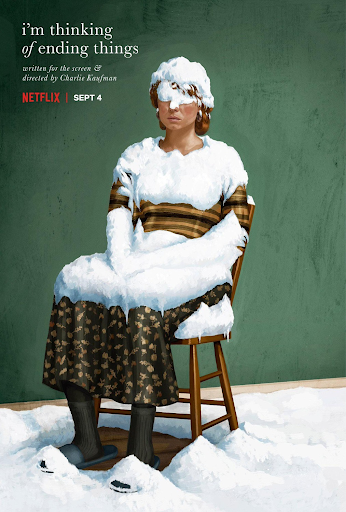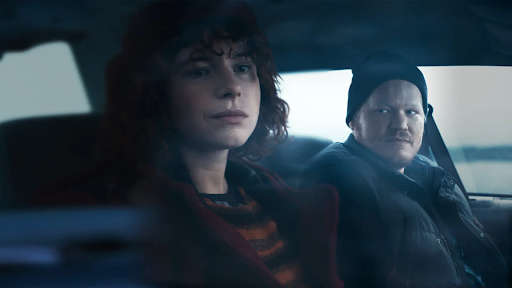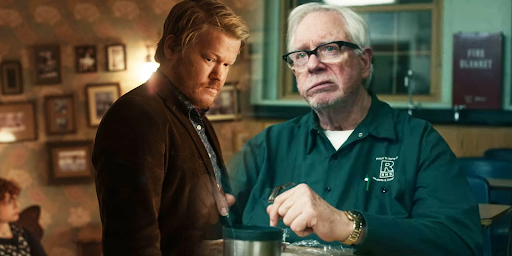The film begins with a long ride through a snowstorm. In the car is a young woman named Lucy (Jessie Buckley) riding with her boyfriend Jake (Jesse Plemons) on their way to meet his parents. The film mainly follows Lucy and Jake’s narrative, but it cuts back and forth between seemingly unrelated scenes of an old janitor. First he is in his home, eating breakfast, watching TV, and getting ready, but for the majority of the film his scenes take place in the highschool where he works. The film’s structure continues in four discernable parts, each part descending further into plotlessness and consequent confusion. After arriving at the parents house, an uncomfortable dinner occurs between the couple and the parents, constituting the second part. After the couple leaves, they stop for ice cream, even though they are in a blizzard. After driving further, they stop to dispose of the ice cream in the parking lot of a highschool. The couple shares a moment outside of the car in the snow, and when Jake sees a man inside the building spying on them - the janitor - he goes in to confront him. This is the bridge to the fourth part of the film, the denouement, when Lucy goes in after him, and the plot following her breaks down completely, ending in a series of surrealist scenes centered around Jake and the janitor. This is a vastly simplified summary, since the complexity of signs and metaphors contained within the movie is immense.
The basement symbolizes his subconscious, or his Id, just as the format of Norman Bates house in Psycho. At a closer examination, Jake’s parents house is akin to the Bates’ house as the representation of the three Freudian levels of the psyche often portrayed implicitly in films: the Superego, the Ego, and the Id. The Superego being the upstairs where the parents reside, their presence acting as a force detached from Jake, and the Ego being the middle floor of (somewhat) normal appearances. The parallel is clear when Jake attempts to stop Lucy from going into the basement. Like in Psycho, when Marion finds Norman’s mother’s corpse in the fruit cellar, once Lucy finally goes down to the basement she finds janitor uniforms in the washing machine. This symbolic object is what Jake tries to hide from her, tries to stop her from finding. It is the traumatic object that holds the key link between Jake and the janitor, who are two sides of the same coin. The basement, a mix of Jake’s Id and subconscious drives, is the reservoir of repressed symbols.
There are constant binary symbols that connect along the timeline of film, symbols that act as the central metaphors for Jake and the janitor’s subjectivity. For example, Lucy recites a poem of her own composition for Jake during the car ride at the beginning of the film. Later on, she finds a book of poetry in Jake’s childhood bedroom that contains the same poem, making her, and the viewer, unsure of whether she is just a figment of Jake’s mental space. Jake’s parents seem to age during the dinner, and at the end of the film Jake stands on stage in front of an audience of everyone he knows, all wearing highschool level production age makeup. This bears reference to the highschool production of Oklahoma that is referenced throughout the film. One of Oklahoma’s central characters is Jud, the dumb, disliked outsider who fails to win the affection of the heroine. The janitor has consistent fantasies about the musical, and Jake sings Jud’s depressing solo about failed dreams in the last sequence of the film, when he’s up on stage caked in age makeup. In the janitor’s last scene, he walks naked down the highschool halls following an animated pig filled with maggots, making reference to the earlier scene when Jake explains to Lucy that maggots ate his parent’s pigs alive. All these connected signifiers point to Jake and the janitor's feeling of being the lonely outsider, and this is the central concept aimed at by the film.




 RSS Feed
RSS Feed
